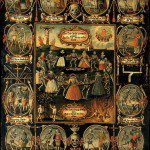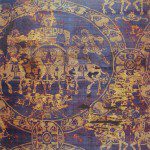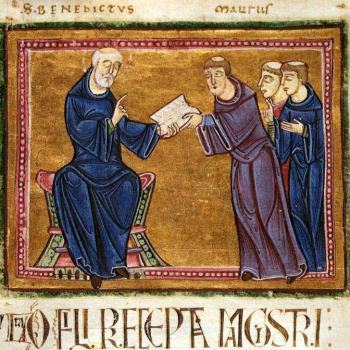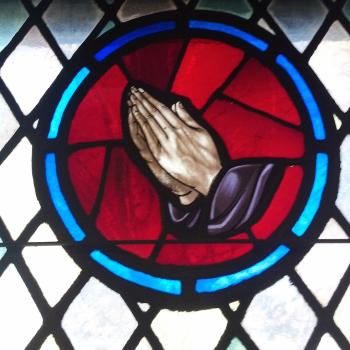Even when we know the material world offers us temptations which will not satisfy, accidie often leads us to treat spirituality through the lens of accidie and so treat spiritual pursuits the way other do material ones. We want nice, simple fixes. We look for the next, best thing. We move from one crazy suggestion to the next, unable to focus and stay put and apply the wisdom contained in good spiritual reflection to the very end. We want what it promises fast, and if we do not get it, we feel we will not obtain it, give up and try something else. For many, monasticism itself could be such a phase. This is not to say people should not explore monasticism and if they find it is truly not their vocation, they have given in to accidie, but rather, those who are addicted to spiritual novelties are likely to try a romantic engagement with monasticism and give up like they do with everything else because of accidie. Anthony certainly faced that temptation, as we can see in this saying.
![Saint Poemen By St. Poimen Greek Orthodox Broterhood Arizona, USA (http://www.members.cox.net/) [GFDL (http://www.gnu.org/copyleft/fdl.html) or CC-BY-SA-3.0 (http://creativecommons.org/licenses/by-sa/3.0/)], via Wikimedia Commons](https://wp-media.patheos.com/blogs/sites/637/2016/10/St._Poimen_the_Great-240x300.jpg)
Anthony, like all of us, faced accidie; this saying gives us a glimpse of his spiritual life development. It likely reflects his experience early within his monastic career, but we cannot be sure. He was not super-human. He faced doubts. He questioned himself. He wondered if he was truly following the path God had planned for him. As he was often alone, all by himself, he probably faced the same temptations coming to him day by day, with no obvious indication that he was having any success against them. Why was he out in the desert, fasting and praying, if he did not find any spiritual relief from all that he had done? He had an all too human reaction to what seemed to be a failure. How long into his hermitage did it take before he started wondering about his profession, questioning himself as to if he should just give it up and go back to the world? It probably did not take long; even if he was more prepared for such a life than many of us in our contemporary situation, he likely would have to deal with the problem of going “stir crazy,” a manifestation of accidie which is common in the world today. When we have nothing to do but stay put, that is when we really come to fight against our worst inclinations, where we can begin the true battle within, to see what we have brought with ourselves, to see what our expectations with ourselves really are, and to see what we need to fight against before we truly are open to God and the joyful grace which he can bring. To come to such joy we must first see and witness our interior darkness, and for ascetics like Anthony, this is where their monastic profession truly takes root, where the spiritual combat truly becomes in view. Anthony, like all of us who come face to face with that darkness, felt its dread as it drained him from all his spiritual and physical energy, leaving him spiritually dry and wondering what he had done wrong. His thoughts were fighting him, and he felt all he had done was ineffective; how could he be saved?
The answer he was given was the answer he knew, and yet had to be told again for reassurance. Go forth and work – labor, do not give such thoughts room in his mind. Work hard, and focus on that work, so he could let go of his thoughts, no longer having to dwell on the doubts they gave him. Work. Do something productive like plait ropes and pray. That is enough. The making of the ropes will show he is doing something worthwhile in a material sense while the prayer will open him up to the grace which leads outside of himself and so will allow the free flow of grace with its joy in his life. Do it, and be saved. Work with God, do not worry about how the world sees the work – just do what God called him to do and pray. The thoughts will be there. The battle might continue to rage on. But his duty in the battle is to push on. He must not despair. He will find joy in God. Salvation is possible – the long work which he is called to do will transform him so long as he does not give up. What he does is not without value. It is not without purpose. And so we, like Anthony, must remind ourselves of this fact: that what we do is worthwhile, and all that accidie suggests to us for our own good will lead not to the joy and happiness we seek, but the sorrow which we dread. We must not cast our proper work aside for a lesser, easier to attain good, because what it brings is only an impermanent good.
Anthony was able to be saved because he heeded the wisdom he had been given. He was reminded that salvation is possible with prayer and cooperation with God’s intention for his life. And so we must keep his example in mind. When we are tempted and wonder what is the use of doing what is good and right, the answer is simple: because it is good and right. We do it for the good, not for some worldly glory. We seek what is good and just, even if we do not immediately see the results in our life. Indeed, often it will appear to others, we have gained nothing, but what is insignificant in the temporal order might be significant and valuable for eternity. What the world sees as worthless can be a vehicle of grace, greater than anything the world can provide. As long as we can remember this, then the thoughts which would lead to the temptation can then be overturned and we can find ourselves victorious against accidie.
[1] The Sayings of the Desert Fathers. trans. Benedicta Ward (Kalamazoo, MI: Cistercian Publications, 1984), 1.
[2] It is connected to and related with “sloth” in the Seven Deadly Sins, however, there are distinctions between what the spiritual tradition made of sloth and with accidie, with accidie being far more expansive a problem and sloth a secondary vice which emerges from it.
[3] Evagrius, “On the Eight Vices” in The Philokalia: The Complete Text. Volume One. trans. G.E.H. Palmer, Philip Sherrard and Kallistos Ware (London: Faber and Faber, 1983), 87.
[4] The Sayings of the Desert Fathers, 188.
Stay in touch! Like A Little Bit of Nothing on Facebook:
A Little Bit of Nothing













